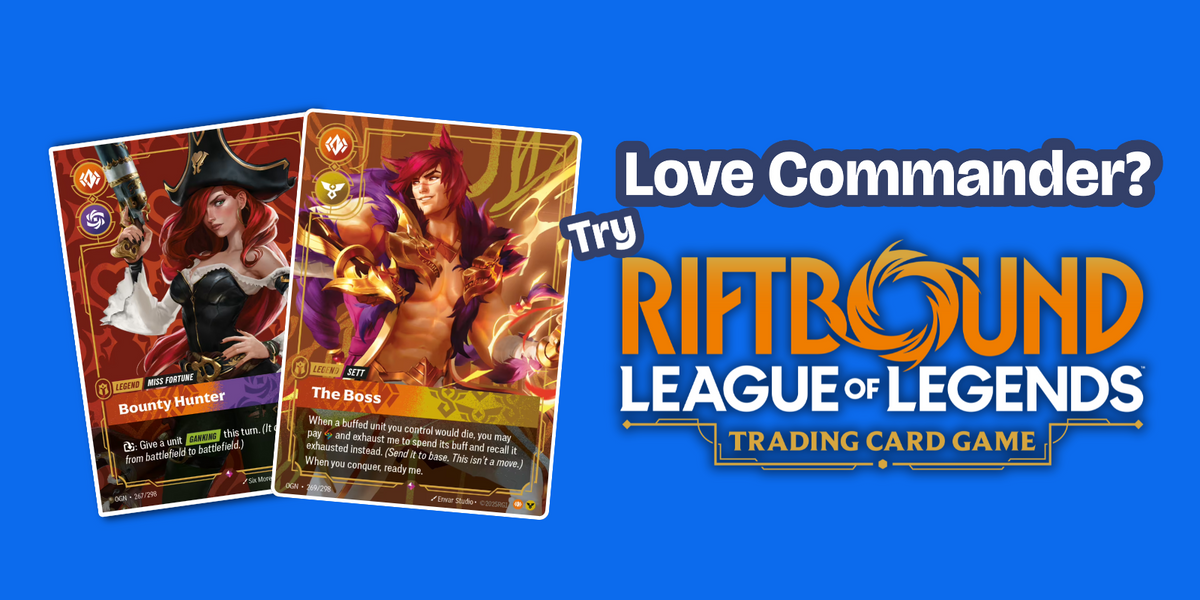

Riftbound, the League of Legends TCG is ready to fill your need for more hero based TCG goodness!
Riftbound is League of Legend’s foray into the world of Trading Card Games (TCGs) and everyone has been abuzz for good reason. League of Legends is an incredibly popular IP with tons of additional games and even a Netflix series like Arcane drawing plenty of players and collectors.
Excited to get into Riftbound? You can preorder your cards here!
But what if you’re a Magic player already? Is it worth getting into Riftbound? How much would you have to learn (or relearn?) Well, we dove into the game and listed three things that Magic players (specifically Commander players) are sure to find interesting in Riftbound!
1. TWO Commanders?
How do you build your first Riftbound deck? This TCG takes its source material to heart by having deck building centred around a Legend and its abilities. Some might say that this is like a Commander, but Riftbound makes some interesting tweaks to the formula.

Building a Riftbound deck means picking both a Legend (your deck’s colour identity and a powerful emblem effect) and a Champion (your “Commander” that can be cast from a special zone).
Choose a Legend
This could be the most important part of your deck building strategy so pay close attention. First off, a legend’s domain (the colours on the card) dictates the colour of your entire deck. For example, if you choose Jinx Loose Cannon, your deck will be in the Chaos (Purple) and Fury (Red) domains.
A legend’s effect is always “on.” Notice how Legends don’t have a cost to them. That’s because they serve as a leader of your deck, helping out from the sidelines. Think of eminence on Edgar Markov or the Ur Dragon, an always-on emblem effect without having to cast it.

Choose a Champion
The Champion is closer to your actual “commander.” You can play them from their special zone by paying its cost. Champions are usually in one of the two colours of your Legend, and have powerful abilities that can turn the tide or close the game out.
Side note: Signature spells are also a key part of the game, but unlike Champions, you don’t have to build your deck with them!
Think of it as a mashup between providing a consistent customisable buff and a leader with signature spells that can swing the game. EDH players who love brewing around legends will find a ton of space to get creative.
2. Runes = Mana you can count on
How do you pay for all these amazing abilities? With Runes, the core resource of the League of Legends world. Just like mana, you “tap” or “exert” or (basically) turn these cards sideways to pay the cost of the cards you want to play (equal to the number on the top left!)

The main difference? You have a rune deck where you draw resources from EVERY turn. That’s right, there’s no mana flushing or mana-screwed here. You’re guaranteed resources every turn so it’s up to your skills.
But there’s one more wrinkle that Riftbound added to the game. Power. Power is an added cost to cards found under the regular cost of cards. To pay for Power, you have to return rune cards of the same colour to the bottom of your rune deck.
For example, you want to play Commander Ledros. When you do, you exert the 6 runes to play him, and then return 4 of the Order (Yellow) runes to the bottom of the deck. A fair price for mighty cards.
3. Don't Take Life, Take Control!
This is where Riftbound really separates from other TCGs. Where other games are all about life points and whittling it to 0, Riftbound is about gaining points by controlling battlefields.

Each player will bring three battlefields and have one selected at random by the opposing player. Then, you and your opponent battle to control these two battlefields. You earn a point for every turn you control a battlefield and the first player to 8 points wins.
Players will need to use Units and their might to take out opposing forces, plus some actions and reactions to keep their opponents off balance. All this makes for a wild game where victory could be changed by a single draw.
Magic or Riftbound? Why not both?
There’s plenty of similarities between Magic and Riftbound where it’s sure to draw players in. But, Riftbound makes some key tweaks that makes it unique from the game while adding some interesting complexity. If you’re already playing Magic or Commander, we suggest trying out Riftbound and trying out this brand new game.
There’s more to Riftbound that we couldn’t cover (yet!) so make sure to stay tuned for more breakdowns of this TCG. Riftbound releases October 31, 2025 but preorders are live right now!
Craving for events? We've got demos and learn to plays at our stores, plus launch events happening soon! Find them all here.




